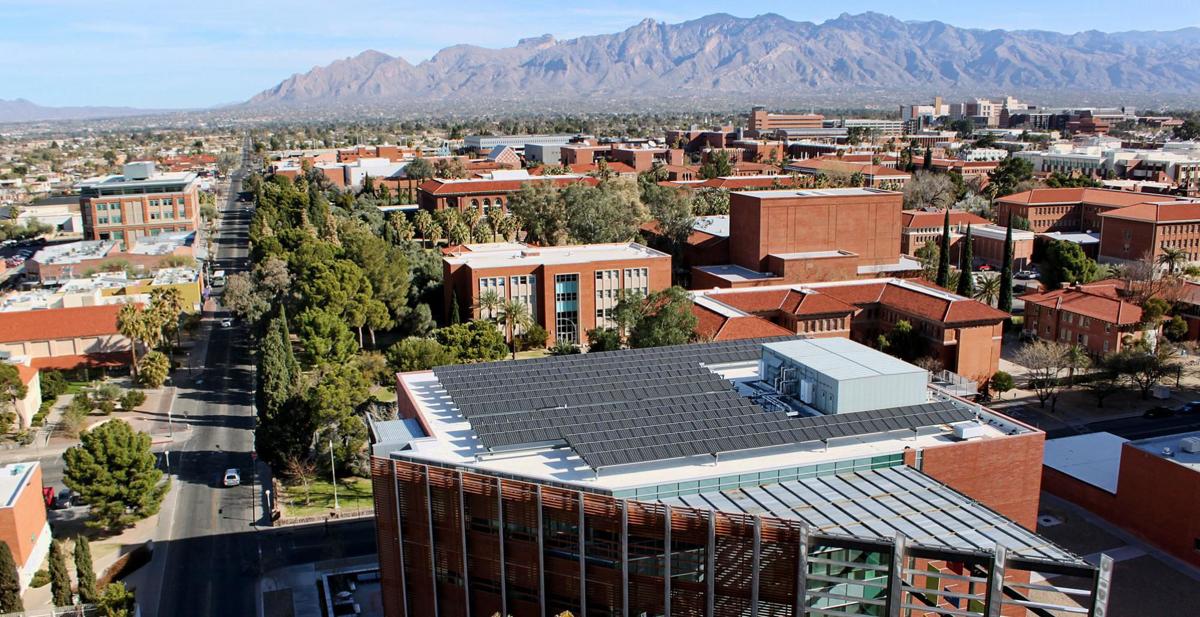State regulators have approved a landmark deal between the University of Arizona and Tucson Electric Power Co. to meet most of the energy needs of the sprawling UA campus with renewable energy.
Under a 20-year pact approved by the Arizona Corporation Commission on Tuesday, TEP will dedicate parts of two pending renewable-energy projects — a 247-megawatt wind farm in New Mexico and a 100MW solar plant with 30MW of battery storage southeast of Tucson International Airport — to meet all of the UA’s power demand from the utility.
The agreement will make the UA the largest research university in the country with a plan to replace all of its purchased power with emissions-free, renewable energy, the university said.
When the projects go on line at the end of 2020, the UA will stay on its large general service time-of-use rate plan but instead of standard rates, the school will be charged a fixed “green energy” charge plus a negotiated charge to account for costs related to integrating renewables on the power grid.
The UA won’t pay more for power, and other TEP customers won’t be subsidizing the UA’s power bill as a result of the deal, UA and TEP officials said.
Chris Kopach, UA assistant vice president of facilities management, said the agreement with TEP will help the school quickly reach its longtime goal of buying 100% renewable power.
“This project provides capacity for consistent and reliable power with capacity for decades of growth in Tucson and on campus — the kind of capacity needed by a Research I university,” Kopach said, hailing the deal as model of collaboration.
The UA is part of the University Climate Change Coalition, which is committed to reducing climate-changing emissions and improving research on climate change policy across its 21-member universities in the United States, Canada and Mexico.
The UA’s utility operations made up more than 70% of its emissions in 2017, 31.6% from electricity and 40% from gas and propane, according to the university’s Greenhouse Gas Emissions Report.
The UA buys about 60% of its power from TEP and generates the other 40% with its own natural-gas turbines.
The university’s overall emissions have decreased by 12.8% since 2015.
The TEP deal is structured so it will not cost the UA any more over its 20-year duration, and it accounts for the planned installation of a new substation to deliver high-voltage power to the campus, Kopach said.
With a variety of energy-efficiency initiatives — including a massive system that makes ice during cheaper off-peak hours to use for cooling during daytime peak usage — the UA has cut its cost of power per square foot to less than it was 17 years ago, Kopach said.
With 140 buildings on the main campus and 180 more in the surrounding area, the university paid TEP about $13.2 million for power during the fiscal year that ended June 30, Kopach said.
Combined with four major solar installations on the UA campus and power from the deal with TEP, the UA will be able to bring up to 4.8MW of renewable energy to campus, he said.
UA President Robert Robbins made sustainability a key part of the school’s strategic plan after arriving in mid-2017.
“We made a commitment to become a more sustainable campus, and now we have in place a system that will make a significant impact in just two years,” Robbins said in prepared remarks.
Construction is expected to begin soon on both the Tucson-area solar project, called the Wilmot Energy Center, and the Oso Grande Wind Project in New Mexico, TEP says.
If either project is not completed as planned by Dec. 31, 2020, the 20-year term of the agreement will start when the last project to be completed goes online, according to details of the power deal filed with state regulators.





